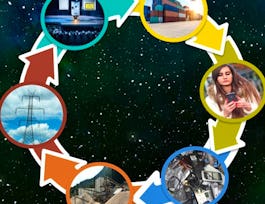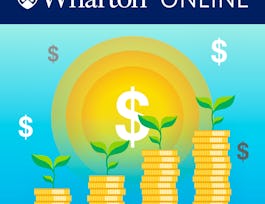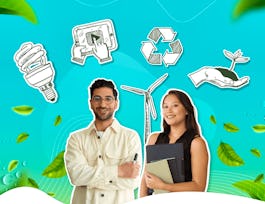In order to deal with global climate change, it is necessary to simultaneously advance both ``mitigation'', which reduces greenhouse gases themselves, and ``adaptation'', which takes measures to reduce the damage caused by climate change. In the field of climate change impact assessment, attention has been focused on the impact on “cities”, and reducing the damage caused by climate change to urban residents and preserving their Quality of Life (QoL) is considered an important issue.



Adapting to the Effects of Climate Change on Quality of Life



Instructeurs : Akito Murayama
Inclus avec 
Ce que vous apprendrez
Basic knowledge about climate change; Basic knoeledge about climate change condition in Japan; Basic knowledge about climate change adaptation
Détails à connaître

Ajouter à votre profil LinkedIn
octobre 2024
4 devoirs
Découvrez comment les employés des entreprises prestigieuses maîtrisent des compétences recherchées


Obtenez un certificat professionnel
Ajoutez cette qualification à votre profil LinkedIn ou à votre CV
Partagez-le sur les réseaux sociaux et dans votre évaluation de performance

Il y a 7 modules dans ce cours
Welcome to the Coursera! Dear Students, Welcome to “Adapting to the Effects of Climate Change on Quality of Life”! No particular due date is set for now. When you start the course, please take a few minutes to fill out our pre-course survey in this section. This helps us understand who you are so that we can accommodate you in the best way possible. Thank you for your cooperation. We hope to create a great learning community where we can learn from one another. Please post your questions and thoughts and exchange views on the course topics in the Discussion Forum. Your posts will be occasionally monitored by course staff; however, owing to the large number of students and limited resources, we may not be able to answer all questions. We would appreciate your understanding. Thank you for signing up for the course “Adapting to the Effects of Climate Change on Quality of Life” We hope you enjoy the course! Best Regards, The UTokyo MOOC.
Inclus
1 vidéo2 lectures1 sujet de discussion1 plugin
This module covers global climate change conditions, climate change conditions in Japan, climate change impacts on people’s lives, climate change risk evaluation (the case study of Japanese mandarin), understanding adaptation challenges through stakeholder interviews, and a summary of them.
Inclus
9 vidéos1 devoir
This module explores the recent research and development in climate change adaptation in the field of urban planning. After introducing the basics of urban planning and climate change, EcoDistricts is introduced as a model framework to address climate change issues at the district scale. Practices in Nishiki 2 District, Nagoya City is explored with a special focus on climate change impact simulation that enables community stakeholders to discuss about the potential adaptation measures.
Inclus
6 vidéos1 devoir
The advent of Society 5.0 introduces an integrated approach where technology enhances every aspect of life, emphasizing the importance of adapting to climate change and enhancing disaster resilience. This course delves into how advanced technological innovations, such as CASE (Connected, Automated, Shared, Electrification) and electric vehicles (EVs), are pivotal in developing strategies for increased resilience to environmental challenges. We place a special focus on sectors like ski resorts, which are particularly vulnerable to climate variability. Through examining a variety of adaptive measures—from strengthening infrastructure to comprehensive disaster preparedness—we aim to uncover how modern societies can navigate the challenges posed by climate change. By leveraging cutting-edge technology, the goal is to protect against future environmental threats while promoting sustainable growth.
Inclus
5 vidéos1 devoir
Promoting longer durability of city is pivotal in fostering a sustainable societal model, shifting away from the prevalent "Flow-based Society" towards a more resilient "Stock-based Society." It's imperative to broaden our sustainability framework to encompass not just energy consumption, CO2 emissions, and climate change but also resource use. Embracing the principles of a Stock-based Society, which prioritizes resource preservation and reuse, can significantly mitigate CO2 emissions by reducing the need for continuous production and minimizing waste generation.
Inclus
3 vidéos1 devoir
Inclus
1 lecture
Inclus
1 plugin
Instructeurs



Offert par
Recommandé si vous êtes intéressé(e) par Governance and Society

University of Michigan

University of Pennsylvania

Banco Interamericano de Desarrollo

Johns Hopkins University
Pour quelles raisons les étudiants sur Coursera nous choisissent-ils pour leur carrière ?





Ouvrez de nouvelles portes avec Coursera Plus
Accès illimité à 10,000+ cours de niveau international, projets pratiques et programmes de certification prêts à l'emploi - tous inclus dans votre abonnement.
Faites progresser votre carrière avec un diplôme en ligne
Obtenez un diplôme auprès d’universités de renommée mondiale - 100 % en ligne
Rejoignez plus de 3 400 entreprises mondiales qui ont choisi Coursera pour les affaires
Améliorez les compétences de vos employés pour exceller dans l’économie numérique
Foire Aux Questions
Access to lectures and assignments depends on your type of enrollment. If you take a course in audit mode, you will be able to see most course materials for free. To access graded assignments and to earn a Certificate, you will need to purchase the Certificate experience, during or after your audit. If you don't see the audit option:
The course may not offer an audit option. You can try a Free Trial instead, or apply for Financial Aid.
The course may offer 'Full Course, No Certificate' instead. This option lets you see all course materials, submit required assessments, and get a final grade. This also means that you will not be able to purchase a Certificate experience.
When you purchase a Certificate you get access to all course materials, including graded assignments. Upon completing the course, your electronic Certificate will be added to your Accomplishments page - from there, you can print your Certificate or add it to your LinkedIn profile. If you only want to read and view the course content, you can audit the course for free.
You will be eligible for a full refund until two weeks after your payment date, or (for courses that have just launched) until two weeks after the first session of the course begins, whichever is later. You cannot receive a refund once you’ve earned a Course Certificate, even if you complete the course within the two-week refund period. See our full refund policy.


